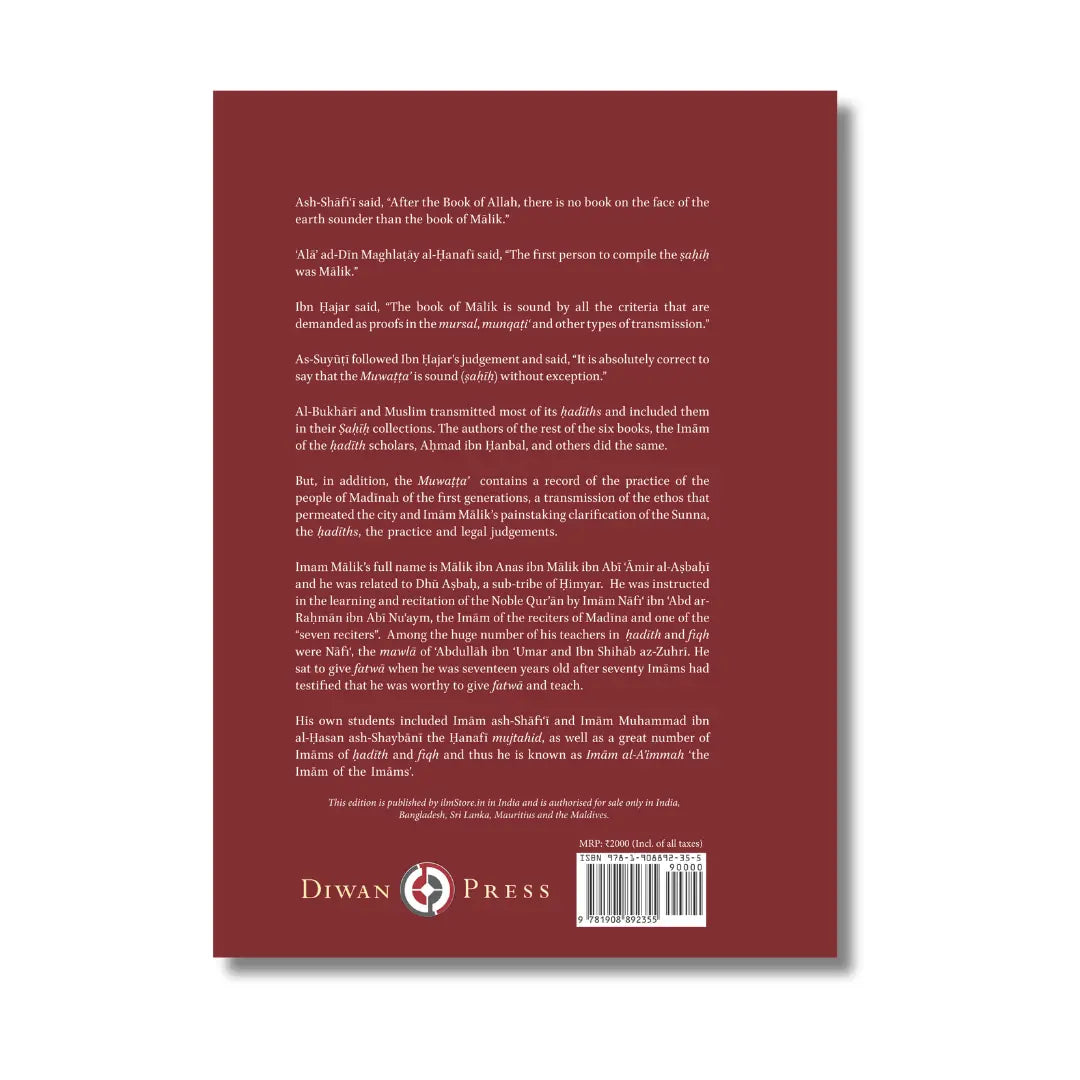Description
Third edition containing only the English translation
Diwan Press are pleased to announce the third revised edition of this classic work.
Al-Muwaṭṭa’
The first formulation of Islamic Law based on the behaviour of the people of Madinah during the time of the Prophet, may Allah bless him and grant him peace, and the great Companions, Al-Muwatta is the blueprint for a just and radiant society: the earliest, clearest, cleanest record of salafi Islam.
Sahih
It is the first of the sahih works, long pre-dating al-Bukhari and Muslim.
Al-Bukhari regarded the transmission of Imam Malik narrating from Nafi‘ from ‘Abdullah ibn ‘Umar from the Messenger of Allah, may Allah bless him and grant him peace, as being ‘the Golden Chain of Transmission’.
Abu Dawud, whose Sunan is another of the Six Books of hadith, added “then Malik, from az-Zuhri, from Salim, from his father [i.e. Ibn ‘Umar], then Malik, from Abu z-Zinad, from al-A‘raj, from Abu Hurayrah”, without mentioning anything from anyone other than Malik.
Ibn Hajar said, “… some imams say that they are unqualifiedly the soundest of isnads, such as az-Zuhri i.e. the hadith which az-Zuhri – who is better known as Ibn Shihab – narrated from Salim i.e. transmitting to him from Salim ibn ‘Abdullah ibn ‘Umar from his father. The school of Ahmad [ibn Hanbal] and Ibn Rahwayh is that this is unqualifiedly the soundest chain of transmission”.
Adh-Dhahabi held that, “The soundest of chains of transmission are those from az-Zuhri from Sa‘id ibn al-Musayyab from Abu Hurayrah” which are abundant in the Muwatta. Then those which come from Abu’z-Zinād from al-A‘raj from Abū Hurayrah.”
Ash-Shāfi‘ī said, “After the Book of Allah, there is no book on the face of the earth sounder than the book of Mālik.”
‘Alā’ ad-Dīn Maghlaṭāy al-Ḥanafī said, “The first person to compile the ṣaḥīḥ was Mālik.”
Ibn Ḥajar said, “The book of Mālik is sound by all the criteria that are demanded as proofs in the mursal, munqaṭi‘ and other types of transmission.”
As-Suyūṭī followed Ibn Ḥajar’s judgement and said, “It is absolutely correct to say that the Muwaṭṭa’ is sound (ṣaḥīḥ) without exception.”
Al-Bukhārī and Muslim transmitted most of its ḥadīths and included them in their Ṣaḥīḥ collections. The authors of the rest of the six books, the Imām of the ḥadīth scholars, Aḥmad ibn Ḥanbal, and others did the same.
In addition, the Muwaṭṭa’ contains a record of the practice (‘amal) of the people of Madīnah of the first generations, a transmission of the ethos that permeated the city, and Imām Mālik’s painstaking clarification of the Sunna, the ḥadīths, the practice and legal judgements.
15.6 x 23.4 cm. 763 pages
Imām Mālik ibn anas
(93 AH/711 CE – 179 AH/795 CE)
Imam Mālik’s full name is Mālik ibn Anas ibn Mālik ibn Abī ‘Āmir al-Aṣbaḥī and he was related to Dhū Aṣbaḥ, a sub-tribe of Ḥimyar. He was instructed in the learning and recitation of the Noble Qur’ān by Imām Nāfi‘ ibn ‘Abd ar-Raḥmān ibn Abī Nu‘aym, the Imām of the reciters of Madīna and one of the ‘seven reciters’.
Among the huge number of his teachers in ḥadīth and fiqh were Nāfi‘, the mawlā of ‘Abdullāh ibn ‘Umar, and Ibn Shihāb az-Zuhrī. He sat to give fatwā when he was seventeen years old after seventy Imāms had testified that he was worthy to give fatwā and teach.
His own students included Imām ash-Shāfi‘ī and Imām Muhammad ibn al-Ḥasan ash-Shaybānī the Ḥanafī mujtahid, as well as a great number of Imāms of ḥadīth and fiqh, and thus he is known as Imām al-A’immah ‘the Imām of the Imāms’.
He is recognised to be the subject of the hadith from Abū Hurayra î:
“The Messenger of Allah, peace be upon him said, ‘There will come a time when the people will beat the livers of their camels in search of knowledge and they will not find an ‘ālim with more knowledge than the ‘ālim of Madīna.’”
Aisha Abdurrahman Bewley
Aisha Abdurrahman Bewley is one of today’s most prolific translators of classical Arabic works into English. For more than thirty-five years she has been concerned with making the contents of many classical Arabic works more accessible to English-speaking readers.
She is co-translator, with her husband Shaykh Abdalhaqq Bewley, of The Noble Qur’an, a New Rendering of its Meaning in English.
Other works include her translation of The Meaning of Man of Sidi Ali al-Jamal, Muhammad Messenger of Allah – ash-Shifa of Qadi ‘Iyad, Muhammad ibn Sa‘d’s Kitab at-Tabaqat al-Kabir, and of her own authorship: Mu‘awiya – Restorer of the Muslim Faith, A Glossary of Islamic Terms, Islam: The Empowering of Women and Muslim Women, a Biographical Dictionary.


 Download Book Preview
Download Book Preview

